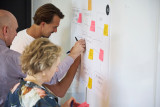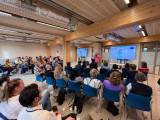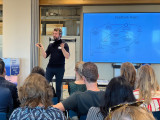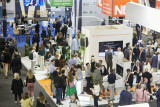Today’s Changemakers #2, Marieke van Doorninck: System Change, Co-Creation and Personal Activism
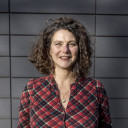
In Today’s Changemakers, we talk with pioneers in our network who are all, in their own way, shaping the city and region of the future. Our second guest on this series is Marieke van Doorninck, director of Kennisland and activist for a just and sustainable world.
Her commitment to societal issues began early in her career when she contributed to shaping prostitution policies aimed at lifting the brothel ban. During this process, she noticed that there was too little consultation with sex workers themselves, and realized that inclusion is essential for social change. With these ideas she started her political career with GroenLinks. During that time, she also worked for an NGO dedicated to fighting human trafficking and exploitation. It was in this role that she came to recognize the inherently exploitative nature of the system we live in. Occupations, where human exploitation is common, happen to be the very ones sustaining our comfortable lifestyles, which involves the mass production of cheap food and supplies. The urge to create a just and sustainable world, motivated her to work fiercely for system change. As Amsterdam's Deputy Mayor Spatial Planning and Sustainability she was committed, among other things, to introducing the Doughnut Economy principles, and since the beginning of 2023, Marieke has been working as director at Kennisland, one of Amsterdam Smart City’s societal partners.
System Change in Politics
Marieke became involved in politics as an activist, however, decision making in politics didn't always happen as quickly or dramatically as she would have preferred. “What I found challenging when working for the Municipality of Amsterdam was that, despite my belief that the proposals we had were beneficial for the people, it was very difficult to discuss them with the residents of Amsterdam. This highlights the significance of the gap between the “system” world and the “real” world. People are preoccupied with other things or might even have better ideas themselves, because they are more directly in touch with the issue. We underutilize the energy and strength that exists there and therefore we still tend to make too many plans for the people and not enough plans with the people”.
“We should focus more on co-creation than mere participation. I believe there's a misconception that not involving people saves time, I think we are coming to realize that not involving people actually leads to a significant loss of time. Therefore, my guiding principle is to provide direction and space, to clearly state what you believe in but don't prescribe exactly how it should happen, and invite everyone to join in and have a say."
Inclusivity and Kennisland
Marieke saw how the system world of the government does not always align with the real world in the daily life of residents, which creates resistance to much-needed change. “... that is why Kennisland became a very interesting place to work for me, because Kennisland's fundamental approach is to always work with the people it concerns. This ensures that their ideas become part of the solutions and their dilemmas are recognized as important problems. That's something I'm passionate about”.
“How can we take steps towards a new living environment? How can we challenge the existing power structures? How can we question established interests? But more importantly, how can we support the plans and ideas from people who are already demonstrating that a different world is possible? This is something Kennisland is good at, engaging in conversations using various methods that demonstrate how everyone can be heard, how inclusivity can be achieved, and how solutions can be created together”.
Marieke then mentions two projects at Kennisland: the Smartphone-Free School and the ‘Buurtgenoten’ game. "The implementation of the Smartphone-Free School originated from a request of the principal who had decided to make his school smartphone-free, but wanted to develop the policy around it with all stakeholders. We then started a conversation with the school, talking to the parents, the students and the teachers about what a smartphone-free school should look like according to them. What are their concerns and how can those concerns be addressed? By involving the school we co-created towards a Smartphone-Free School. As another example, we developed the 'Buurtgenoten' game, which helps identify what a neighborhood needs by initiating conversations about what the community can and cannot do on its own. When you ask something of the neighborhood, you shouldn't just inquire, 'Will you do this?' You should also ask, 'What do you need to fulfill that role?”.
Amsterdam Smart City: Addressing more societal issues and a service-oriented role.
Throughout her career, Marieke has gained valuable insights on bringing about change, which she is willing to share with Amsterdam Smart City: "What Amsterdam Smart City could certainly do well is examine what is happening in society and how you can be supportive or service-oriented in response. How can all the knowledge, expertise, and intellectual power within the Amsterdam Smart City network be utilized for the benefit of those trying to make a difference in their own living environment? I believe that Amsterdam Smart City has everything it takes to fulfill and assume that role. The emphasis could move slightly away from the partner's point of view and towards the larger interests of society. Because, if you truly want to make a difference for the city, there are things that must be done entirely based on the importance of the problem you are seeking to address. For example, I work for Kennisland not necessarily because it serves my own interests but because I believe it is for a good cause, and I have something valuable to contribute".
Dream Scenario for the Amsterdam Region: Solidarity
Due to Marieke's involvement within the city of Amsterdam, it's especially valuable to know what her dream scenario would be for the Amsterdam Region. According to her, the region should “... learn to collaborate through cooperation instead of competition. Work in solidarity with each other, both within the region and globally. It would be wonderful to adopt a sort of international solidarity position, meaning that we, as a region, take care of ourselves in a way that also benefits the rest of the world. I believe that such a region forms an ecosystem in itself, creating short chains and focusing on how cities can mutually strengthen each other. One city may have something that can be shared with another city, encouraging an ongoing exploration of how cities might reinforce each other, the natural environment and the ecological systems. Consequently, financial gains should become less of an individual concern, as we strive for a healthier and improved region that, in turn, contributes positively to the global community or, at the very least, causes no damage. Then we would have already achieved a great deal."
Marieke's advice for our readers: Personal Activism.
When you're in conversation with Marieke, it inspires you to take on a more activistic position in both your personal and work life. So to round off this interview we asked her about some advice for our readers and their personal activism ambitions: "First of all, join activist groups, find out what is happening in your neighborhood or field of interest and see how you can contribute. But also, even in more conventional surroundings, it's about finally saying the things that you feel need to be addressed but never felt comfortable to actually say, out loud. Dare to ask questions and see if there are people who share similar thoughts. This way, it won't be as intimidating to ask such questions. I believe that people's willingness to cause discomfort is becoming increasingly crucial. Without discomfort, nothing will change”.
“Moreover, I also believe it's crucial not to underestimate that if you have a good idea, you can simply start working on it without having it completely figured out. At a certain point, you must also dare to say, ‘I believe we should head in this direction, even though I am not exactly sure how we'll get there’. In the end, activism is about fighting for systemic change. So, I think activism, in all its forms, means making sure the world knows that so many of us think we should move in a different direction".
In 2024, we continue our collaboration with Marieke’s Kennisland as one of Amsterdam’s Smart City’s ‘Societal partners’. Kennisland representatives are part of our so called ‘Wicked Problems Team’ and they help our network strengthen its societal impact. Marieke is also part of a new Post-Growth initiative, initiated by Amsterdam Economic Board, Kennisland and other Marineterrein partners.
This series started off in 2023 with a conversation with Romy Dekker, Senior Researcher at Rathenau Instituut. Read about her story and the use of Digital Technologies in The Energy Transition here.
Image by: Kennisland

